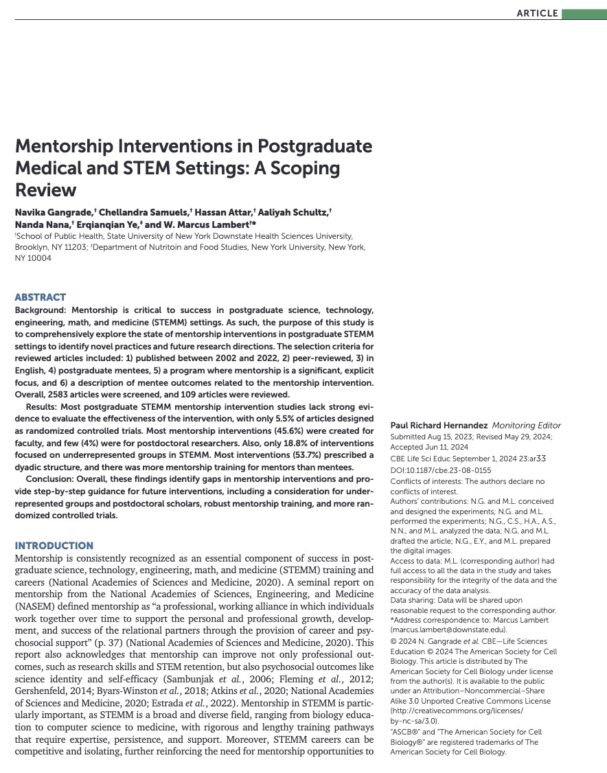Recommended audience(s):
STEMM education researchers, mentorship program directors, academic administrators, EDI practitioners, postgraduate trainees and postdocs
Review prepared by:
Siobhan Carroll, Ph.D
In “Mentorship Interventions in Postgraduate Medical and STEM Settings: A Scoping Review,” Gangrade et al. review mentorship intervention studies in postgraduate science, technology, engineering, math, and medicine (STEMM) over the past two decades. Analyzing 109 studies, they found interventions primarily targeted faculty (45.6%) while overlooking postdoctoral scholars and underrepresented groups—a notable gap given mentorship’s role in fostering retention and success for these populations. Most mentorship models were dyadic (one-on-one) (53.7%), though network mentoring (a single mentee paired with multiple mentors) was highlighted as a promising alternative for holistic support. The authors also noted a lack of training for mentees, emphasizing that structured training for both mentors and mentees is essential for effective relationships.
The review revealed inconsistencies in outcome measures across studies, complicating comparisons of intervention effectiveness. The authors call for a standardized set of validated measures. They highlight the scarcity of randomized controlled trials (RCTs), with only 5.5% of studies using this design. While RCTs are essential in some cases (particularly where outcomes are qualitative), the authors’ dismissal of non-RCT designs as “low certainty” evidence is overly simplistic, as careful statistical methods in observational studies can address exchangeability concerns.
The review provides a valuable framework for future mentorship studies but lacks discussion on how different types of mentorship (e.g., for medical residents versus PhD students) may require tailored interventions. Similarly, it does not address whether interventions can be universally applied across diverse institutional settings despite likely heterogeneity. Additionally, most interventions relied on voluntary participation, raising concerns about selection bias, which was not discussed.
This paper highlights critical gaps in mentorship interventions and emphasizes the need for more inclusive approaches, especially for underrepresented groups and postdocs. Future work should explore alternative mentorship models, comprehensive mentee training, and standardized outcomes to build a stronger evidence base for effective postgraduate mentorship.

